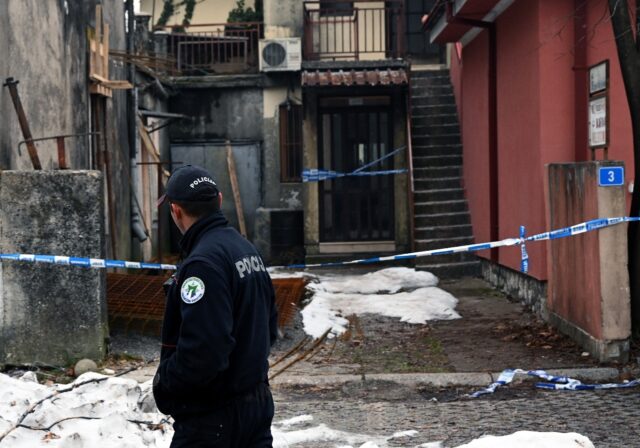Montenegro on Thursday began three days of national mourning, a day after a gunman killed 12 people including two children in a shooting rampage that started in a restaurant.
The 45-year-old attacker died after shooting himself in the head when he was surrounded following an hours-long manhunt, police said.
“Twelve people were killed, of whom two were children,” prosecutor Andrijana Nastic told reporters in Cetinje, the small southern town where the killings took place.
The victims were killed at five different locations, with the first four in the restaurant where the shooting began, she added.
The rampage started around 5:30 pm (1630 GMT) on Wednesday at a Cetinje restaurant, police chief Lazar Scepanovic told a press conference on Thursday.
Police initially rushed to a nearby village after being wrongly informed that the restaurant was located there, he added.
Most of the victims, all killed within some 30 minutes, were the gunman’s “acquaintances, friends, godfathers and closest relatives” including his sister, Scepanovic said.
The victims were seven men, three women and two children, he added.
Police said the two murdered children were aged eight and 13. They had earlier given the younger child’s age as 10.
Four people were also seriously injured and received hospital treatment in the capital, Podgorica.
On Thursday, all four were at an intensive care unit and their lives were in danger, a hospital statement said.
‘Completely senseless’
Locals expressed shock at the atrocity.
“To kill children… is completely senseless. That is not a crime, it is something more than that,” pensioner Danilo Zecevic told AFP.
In the evening, a few hundred residents gathered in silence in the central part of Cetinje, lighting candles for the victims.
Citizens also gathered in other towns across the country including Podgorica, where several hundred people lit candles in the main square and signed a book of condolences.
“What can I say about this case? Sadness, sadness, silence… This is not the first case. All of this is a consequence of uncontrolled arms-carrying,” pensioner Boro Bozovic, 76, told AFP.
Police said earlier that the suspect had been drinking all day long before an altercation broke out between him and another restaurant guest.
He left to take a weapon before returning to kill four people at the restaurant and then moving on to the other locations, Scepanovic said.
Police had ruled out any “showdown between organised criminal groups”, adding that the gun the killer used was owned illegally.
Weapons control
Prime Minister Milojko Spajic said the shootings erupted after a restaurant fight “went wrong, labelling them a “terrible tragedy”.
He raised the prospect of a review of the country’s gun ownership laws, including considering a complete ban on the possession of weapons.
The country’s National Security Council is to meet on Friday to review “key challenges in the detection and seizure of illegal weapons” as well as the recruitment of additional police officers, a government statement said.
Scepanovic said on Thursday that the gunman had a history of possessing illegal weapons, of which some were seized from him in 2022. He had been sentenced to three months in jail but appealed the verdict.
According to the Small Arms Survey (SAS), a Swiss research programme, there are approximately 245,000 firearms in circulation in Montenegro, a nation of just over 620,000 people.
In 2022, a man murdered 10 Cetinje residents, including two children, in broad daylight before being killed, in one of the deadliest such incidents to rock the country.
Cetinje, with a population of around 13,000 people, is the site of the former royal capital and sits in a mountainous valley that has largely stagnated economically.
The area and its surroundings are strongholds of organised criminal groups, and clashes erupt sporadically between rival mafia clans.
Organised crime and corruption remain two major issues plaguing Montenegro that authorities have pledged to tackle in its bid to join the European Union.

COMMENTS
Please let us know if you're having issues with commenting.